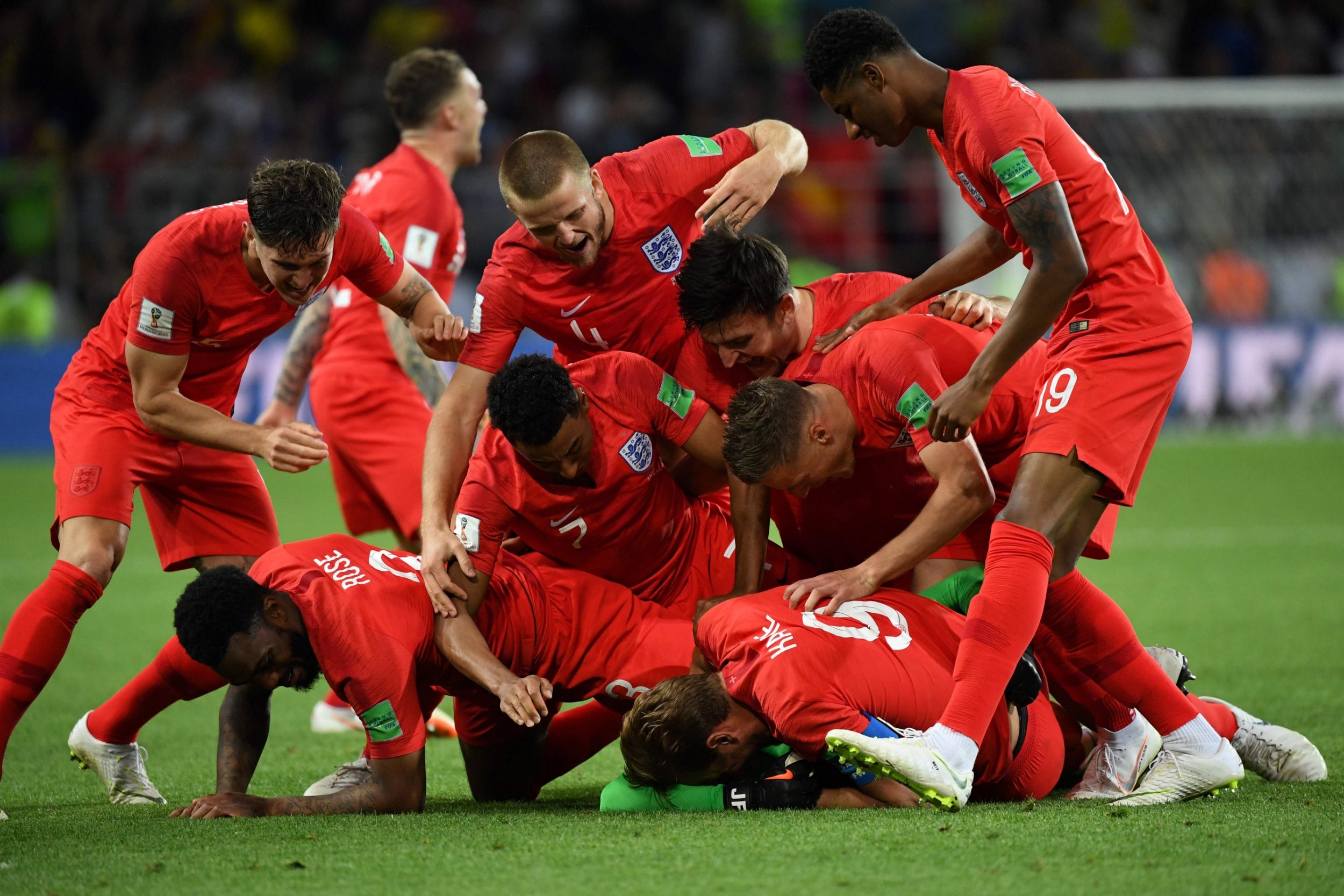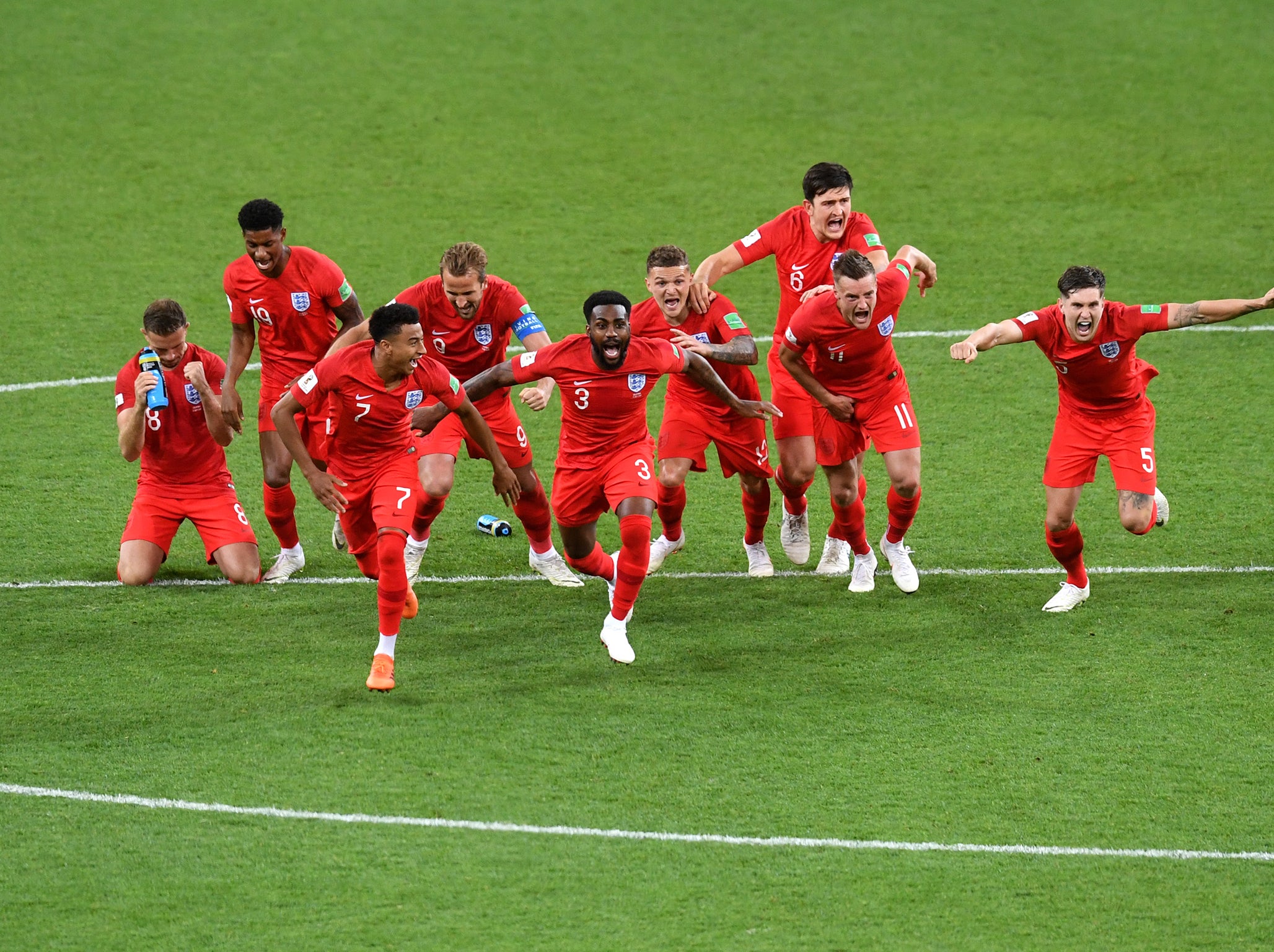England vs Colombia: The horrors, the past, the penalties, but mainly the refusal to blink in the stadium lights
England won their first ever World Cup shootout in the most dramatic of circumstances in Moscow

Your support helps us to tell the story
From reproductive rights to climate change to Big Tech, The Independent is on the ground when the story is developing. Whether it's investigating the financials of Elon Musk's pro-Trump PAC or producing our latest documentary, 'The A Word', which shines a light on the American women fighting for reproductive rights, we know how important it is to parse out the facts from the messaging.
At such a critical moment in US history, we need reporters on the ground. Your donation allows us to keep sending journalists to speak to both sides of the story.
The Independent is trusted by Americans across the entire political spectrum. And unlike many other quality news outlets, we choose not to lock Americans out of our reporting and analysis with paywalls. We believe quality journalism should be available to everyone, paid for by those who can afford it.
Your support makes all the difference.Half-time in extra time. England’s desperate, exhausted footballers gathered around in a shape you could only loosely describe as a circle. Officially we had been playing for 105 minutes. In reality, it was almost two-and-a-half hours since the game had started with a promise, a riot of colour and a bloom of noise that seemed now to belong to another world.
Gareth Southgate leaned in and began talking. Marooned beyond the touchline, we didn’t hear what he was saying. But after a few seconds, it became clear that very few of his players did, either. Some glanced occasionally towards him, blinking at this strange man in the croupier’s waistcoat. But most were simply engaged in their own reverie: a demonic dance visible only in their heads, their own private Vietnam. Passing lanes. Half-spaces. The voices. Press the last man. The noises. Trust each other. The horror. The horror. The horror.
It had been a horrific game: to watch, to write about, to predict, to play in, to manage. If sport is war without the shooting, then this was more akin to an episode of The Jeremy Kyle Show in shorts: a game of irascible, almost intolerable bitchiness, surly and spiky, the product of two teams with the will to triumph, but not necessarily the skill. As the mountain of penalties began to swallow England in its shadow, it’s a fair bet you were thinking what the bloke next to you was thinking, which is what your mate on WhatsApp was thinking, which is what your mum was thinking, which is what I was thinking. Oh dear.
And England won. Against Colombian elbows and Colombian studs, they won. After suffering, in the third minute of injury time, the sort of concussive blow from which it was assumed only champions really recover, they won. Against the soul-crushing weight of their own leaden history, the 12 yards that have defined lifetimes, they won. Bearing the tipsy reveries of a nation that has finally learned to adore them, they won. What does that tell us about them?

Perhaps nothing. This wasn’t, after all, one of those games from which there were stunning conclusions to be drawn. Nor was it one of those games that seemed to fit some wider tactical narrative, an established strength or an endemic weakness. Nor was it a game in which very much - unless you were a connoisseur of sumo - happened at all. England and Colombia pulled each other’s shirts for 120 minutes. Neither of them was very good. England won by four penalties to three. And that, really, was it.
It wasn’t football. You couldn’t call it football, even by its loosest definition. This was something else. The question of whether England or Colombia were the superior footballing nation - a question that encompasses culture, systems, economics, physiology, coaching and a million other variables - had long since passed into irrelevance.
What we were seeing instead was the sort of thing that happens when sport descends into a test of stomach: a battle of will and courage and brawn and sufferance, as much about morals as it is about talent. How low will you go to win this? How deep will you delve into your reserves of cynicism and cruelty? Because England discovered early on, if they didn’t know it already, that Colombia’s went extremely deep.
And so what transpired was not so much a knockout-stage game at the biggest football tournament at Earth as the sort of thing you would watch on Bravo at 2am after coming home from the pub: one of those minor fight sports in which the muscles were artificial but everything else, including the pain, was real. The Colombians fought for everything, challenged for everything, appealed for everything, chased everything.
A short and by no means exhaustive catalogue of Colombia’s skullduggery (and that's just the first 45 minutes):
1) Juan Cuadrado standing directly in front of Ashley Young as he prepared to take a free-kick, refusing to give an inch, much less 10 yards.
2) Falcao rushing up to Jordan Pickford to prevent him taking a quick goal-kick.
3) Yerry Mina - a lovable if overly tactile 6ft 4in Barcelona centre-half with a mournful gait and strong arms that just want someone to hold - trying to ride Raheem Sterling like a mule.
4) Cuadrado - again - giving Harry Maguire a meaty shove as the ball bounced out of play for a throw.
5) Wilmar Barrios flicking his head into Jordan Henderson’s as they lined up in the wall.
6) As referee Mark Geiger - whose performance was not only unworthy of a World Cup last-16 game, but barely worthy of his stadium accreditation - marked out the 10-yard line with his disappearing spray, Cuadrado - again! - immediately trying to rub it out with his hand.
7) One of the Colombian technical staff body-checking Sterling as he ran down the tunnel at half-time.
It was ugly and it was uncompromising. But it was the World Cup. What else were they going to do? Every amateur footballer in the world has come across an opposition team like this at some point. They have the big centre-half who grapples, the midfielder who scythes at your ankle, the full-back who knocks the ball out of play and then furiously claims the throw-in. Very often they have Falcao. And before long England realised that there would be no safety net, and with the imbecilic Geiger in charge, very little statutory recourse. They had to mix it up.
And so after Harry Kane’s penalty had put England ahead - and maximum villain points to Johan Mojica for doing his best to scuff up the penalty spot in advance - England resorted to their own dark arts. Time-wasting tactics. Injuries that had the look, if not quite the feel, of life-threatening emergencies. No-frills keep-ball football. It seemed to work a treat. Then Mina went up for a corner, used Maguire’s shoulders to leverage himself upwards, and nodded the ball in. It happens.
In the stands, Colombia had the clear numerical advantage, probably five or six to one. The Spartak Stadium was El Campin with Gazprom adverts. They emptied their lungs, and then emptied them some more. The English band, most of whom were hemmed into a little square at the southern end of the ground, beat their drums in response like a racing pulse. On the pitch, England gathered kindling for another attack. But their moves were falling apart, their passes going astray, their touches the touches of tired men. Penalties loomed.

And England won. What does that tell us about them? Perhaps that they’re a little more streetwise than we thought they were. Perhaps that history has no bearing on them. Perhaps that they’re just two wins from the World Cup final. Perhaps that as disaster reared its head, as a nation dug its fingernails into its palms, as the lights blinked in the stadium rafters, scorching the pitch with truth, England refused to blink back. That might come in handy later.
Join our commenting forum
Join thought-provoking conversations, follow other Independent readers and see their replies
Comments